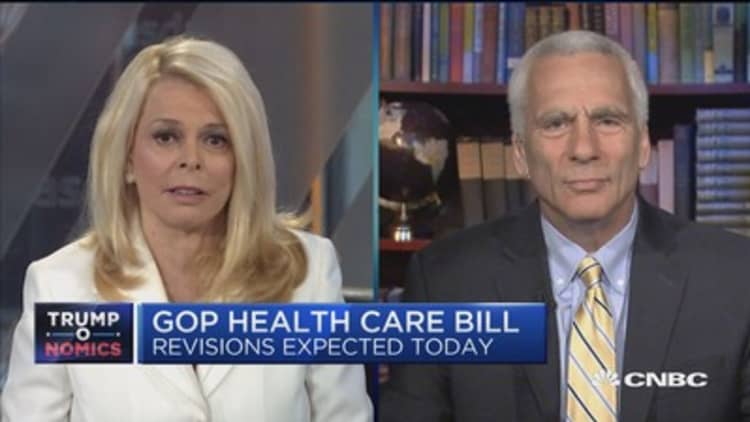Makers of just 10 drugs may have shortchanged the nation's Medicaid system by at least $1.3 billion from 2012 through 2016 by misclassifying their products in a rebate program, a government analysis found.
The analysis also showed that while nearly 900 drugs may have been misclassified, in 2016 just four drugmakers were responsible for 54 percent of the potential misclassifications that led to the underpayments to the Medicaid Drug Rebate Program.
And just two drugs were responsible for 90 percent of the potentially lost rebates identified by the Office of Inspector General of the federal Health and Human Services Department.
Neither the drugs nor their makers were identified in the OIG's report.
The report comes four months after big drugmaker Mylan finalized an agreement to repay Medicaid a whopping $465 million to settle claims it shortchanged the program on rebates for its pricey anti-allergy device EpiPen for years.

Last week, New York state Comptroller Thomas DiNapoli said that his state alone could still collect on nearly $119 million in Medicaid rebates that went unpaid by drugmakers from 2010 through last March.
Medicaid, which is jointly run by the federal government and individual states, provides health coverage to nearly 70 million low-income Americans.
When drugmakers have their products covered for Medicaid beneficiaries, they are supposed to pay the Drug Rebate Program a fraction of their total sales. The amount of the rebate depends on how a drug is classified. For so-called noninnovator drugs, such as generic products, the rebate is equal to 13 percent of sales through Medicaid. But for innovator drugs, or brand-name products, the rebate rate is at least 23.1 percent of Medicaid sales.
However, the rebate rate is higher — sometimes much higher — if the drug's price has been raised beyond the rate of inflation.
Mylan's classification of EpiPen as a noninnovator drug drew attention in the summer of 2016 when outrage erupted over a series of steep prices hikes that left a two-pack of the device costing $600 over the counter.
Although Mylan defended the classification as being proper, Congress asked HHS' inspector general's office to evaluate the accuracy of the drug rebate program.
Last May, OIG found that Mylan may have underpaid Medicaid $1.27 billion in EpiPen rebates from 2006 through 2016 as a result of misclassifying the device at the lower rebate level. That was significantly more than the company ended up settling for.
The newest report from OIG compared how the approximately 30,000 drugs in Medicaid's rebate program were classified by their makers compared to how the same drugs were reported by their makers for the Food and Drug Administration's marketing categories.
OIG found that 885 of the drugs, or 3 percent of the total, were misclassified in 2016. "The vast majority," or 97 percent of those drugs, were classified as noninnovator products in the Medicaid file, meaning they paid the lower rebate, but as innovator products to the FDA, OIG's report said.
The cost to Medicaid for covering the misclassified drugs to beneficiaries was more than $813 million in 2016, the report found.
OIG's report specifically looked at the rebates paid for 10 misclassifed drugs which were the highest in terms of Medicaid reimbursement.
From 2012 through 2016, the report found, Medicaid claimed $199 million in noninnovator rebates.
But if the drugmakers had classified their products as innovator products — as they had done for the FDA — they "may have owed an additional $1.3 billion" in rebates, OIG's report found.
The report also noted that that $1.3 billion in potentially lost rebates is equivalent to 87 percent of the $1.5 billion that Medicaid paid in reimbursements for the drugs during the same time period.
In other words, Medicaid could have recouped nearly $9 for every $10 it spent on those drugs if the drugs were properly classified.
Because no drugmaker was identified in the newest report from OIG, it is not clear to what degree underpayments for only EpiPen contributed to the total amount of underpayments.
OIG's report pointed out that the federal Centers for Medicaid and Medicare Services "does not have the explicit authority to require manufacturers to chance their classification data."
And while CMS told OIG that it works with drugmakers to fix potential errors once they are identified, "CMS does not track or maintain a central database of these potential errors or their resolutions," the report noted.
CMS agreed to take a number of steps recommended by OIG in the report.
They include reviewing the potentially misclassified drugs identified, and following up with manufacturers, as well as developing a new reporting system that could reduce classification errors. CMS also will consider methods to improve the agency's ability to compel drugmakers to correct their classifications.
CMS, in a statement issued to CNBC, said the agency "takes seriously the responsibility to oversee the Medicaid Drug Rebate Program and has taken a number of recent steps to clarify reporting requirements and communicate to manufacturers when they have reported incorrect information."
"To keep manufacturers honest, CMS manually reviews each new drug that has been reported in the Medicaid rebate system on a quarterly basis to make sure drugs are classified correctly," said CMS spokesman Jonathan Monroe.
"We are continuing to do as much as statutory authority allows to protect the integrity of the Medicaid program," Moore said.
Sen. Chuck Grassley, R-Iowa, said in a prepared statement that the OIG's report suggests that Mylan's misclassification of EpiPen "was just the tip of the iceberg."
Grassley also said that the potential underpayments identified by the report is "not chump change, and it can't be swept under the rug."
"While I'm glad CMS has indicated that it will follow HHS OIG's recommendations, it should also commit to aggressively pursuing corrective action to recoup the billions of taxpayer dollars from all 885 potentially misclassified drugs in consultation with the HHS OIG as appropriate," the senator said.
WATCH: Graham-Cassidy would block grant Medicaid



